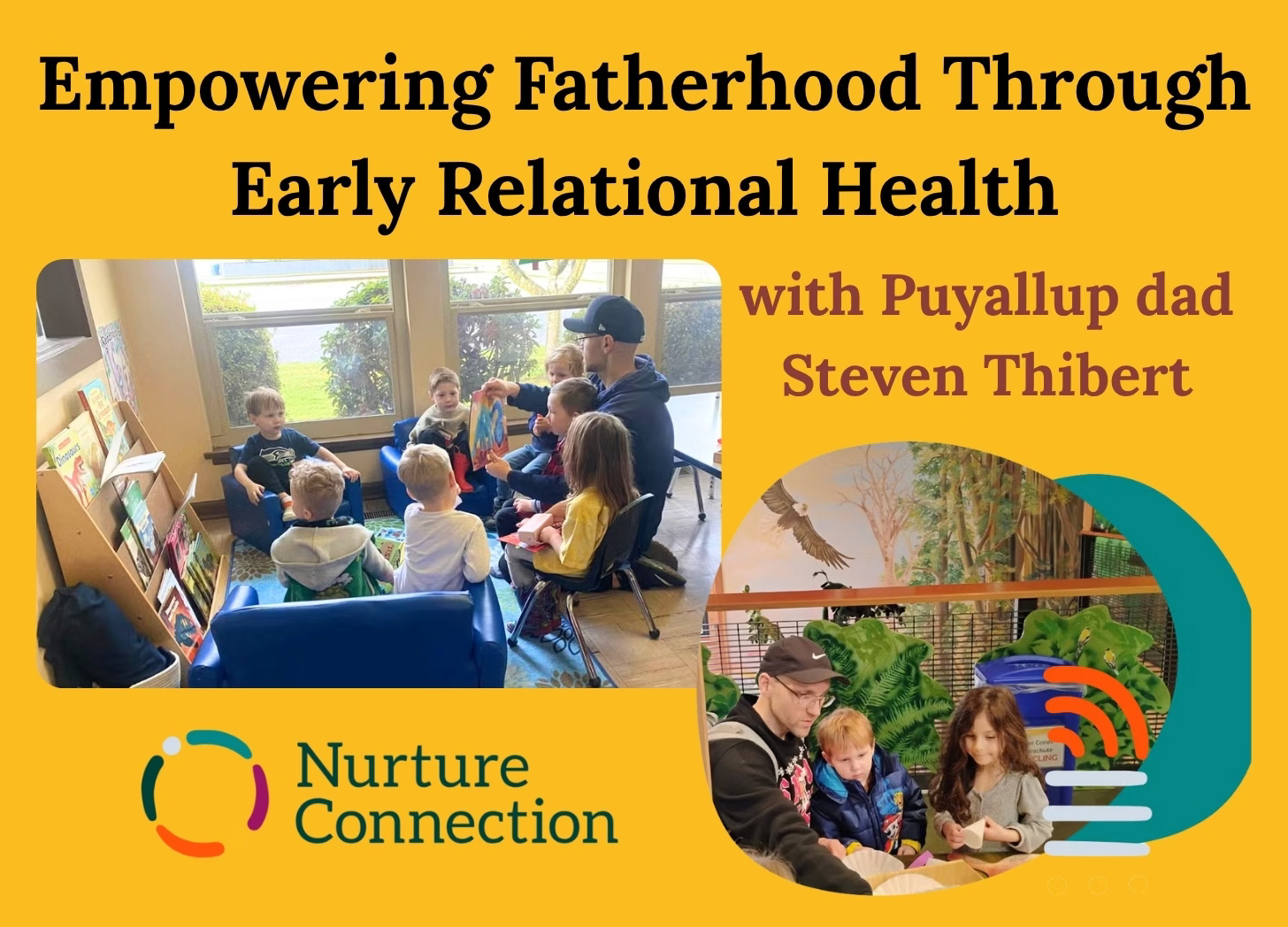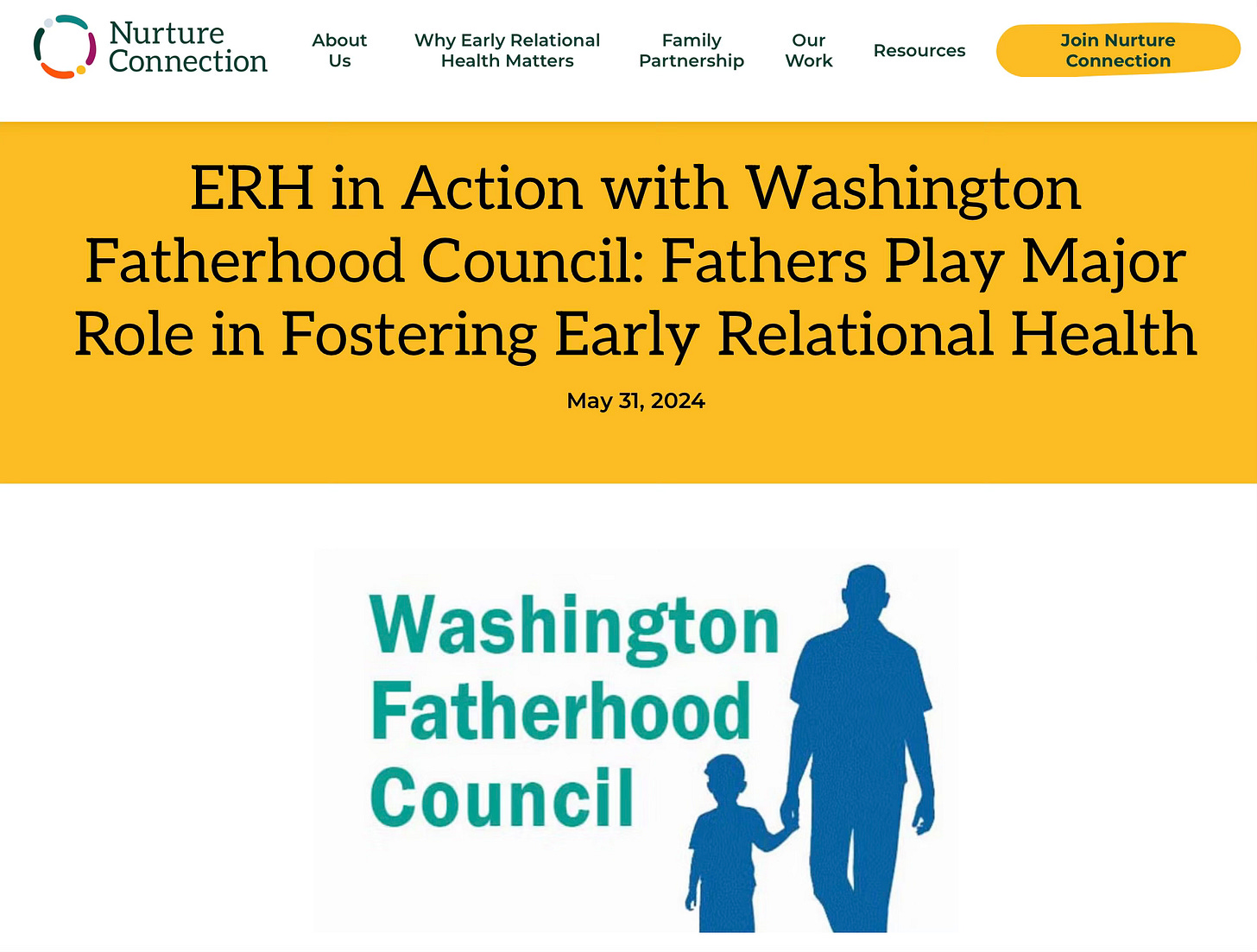Early Relational Health Org Highlights Local Dad Steven Thibert
Plus: Legislature frowns on mutual protection orders, and marriage license fee goes up to fund domestic violence response programs
The Washington Fatherhood Council’s latest Fatherhood Summit was held in Tacoma a year ago. One of our favorite presenters was David Willis, who is a pediatrician, a fellow with the Center for the Study of Social Policy, and the founder of Nurture Connection: The Movement for Early Relational Health. (View his presentation slides here.)
This month, the Nurture Connection organization featured comments and reflections from Puyallup dad Steven Thibert on their website and in their newsletter.
Steven is a friend of Washington Initiative for Boys and Men and someone who’s been involved for years in the work of the Washington Fatherhood Council led by Anne Stone and Dieter Jacobs, staff of the Department of Social and Health Services. Steven is also directly involved with the Nurture Connection organization as a Steering Committee member and a Parent Leader with their Family Network Collaborative.
Quoting from Steven in the piece above:
“We can’t control outcomes, but we do control our inputs — our actions to make change. There are so many people I’ve interacted with at the state level and even the federal level in positions of power who realize that now is the time to recognize the importance of fatherhood and Early Relational Health.”
Nurture Connection and the Fatherhood Council
Last year Nurture Connection teamed up with the Washington Fatherhood Council, including Steven Thibert, to co-host a group discussion on the importance of dads to their kids’ development. Here is a screenshot and an excerpt from their blog post recapping that event:
“It’s important to lift up dads and give them the encouragement and confidence they need to step up their parenting. Dads need positive reinforcement just like any of us. A little goes a long way to build confidence and reassurance. You don’t need a master’s degree to parent—dads are already inherently important to their children’s ability to thrive.” - Nurture Connection
Below is the full recording:
$100 increase in marriage license fee to fund new domestic violence co-responder grant program
Washington’s legislature passed a bill that requires counties to add a $100 fee on top of existing fees when issuing marriage licenses. The revenue from the fee will pay for a newly-created Domestic Violence Co-Responder Grant Program to be administered by the Office of Crime Victims Advocacy in the Department of Commerce.

According to the new legislation:
(2) The domestic violence co-responder grant program must:
(a) Award matching grants to cities and counties for the purpose of establishing and operating domestic violence co-responder programs;
(b) Provide contracted technical assistance and training for grantees using a service provider that has demonstrated effectiveness in providing domestic violence co-responder services; and
(c) Provide contracted services to assist grantees in billing health insurance for domestic violence co-responder services.
(3) For the purposes of this section, a "domestic violence co-responder program" is a program utilizing domestic violence victim advocates that are summoned by law enforcement to the scene of a domestic violence incident and that provide whole family support, resource connection, and care navigation for victims.
On the floor of the House of Representatives, the bill’s prime sponsor, Rep. Lauren Davis (D-Shoreline), explained:
Domestic violence co-responders operate much like behavioral health co-responders. They are called to the scene by law enforcement and they bring victim advocates to the scene — victim advocates who are culturally competent, who are multilingual, who work with the families and individuals. They provide them immediate safety planning, hotel vouchers, mental health treatment, and they assist with relocation if that’s necessary.
For the one domestic violence co-responder program we have in the state of Washington, 85% of their victims have actually been able to escape their abusers. What that tells us is that in the other cases where these programs don’t exist, it’s not that victims don’t want to leave, it’s that they can’t. The programs that this bill will help to establish in so many of our districts will make that freedom and a new life free of abuse a reality for so many victims and survivors across the state. I encourage your support.
Somewhat uniquely, both the Yes votes and the No votes on this bill were comprised of a mix of Democrats and Republicans, in both chambers:
House of Representatives: 70 Yes votes (51 Ds + 19 Rs) to 28 No votes (20 Rs + 8 Ds)
Senate: 38 Yes votes (28 Ds + 10 Rs) to 10 No votes (9 Rs + 1 D: Sen. Bob Hasegawa)
Attempts made to change the funding method
State law will now require county officers to collect the following fees when issuing a marriage license:
$8 for the cost of filing and transmittal
$5 to the general fund for the support of activities to prevent child abuse and neglect
$10 to the general fund (formerly to support the Displaced Homemaker Act)
$100 for the Domestic Violence Co-Responder Grant Program account (new)
Three Republican legislators proposed amendments that would have altered the mechanism for financing the Domestic Violence Co-Responder Grant Program:
An amendment by Rep. Jenny Graham would have funded the program via a $50 penalty charged to any adult offender convicted of a crime involving domestic violence, rather than through a $100 increase in the cost of a marriage license. Rep. Lauren Davis spoke in opposition to this proposal, stating that it would only raise about $40,000, rather than the $4 million anticipated from the increase in the marriage license fee. The legislature did not adopt the amendment.
An amendment by Rep. Travis Couture, which was withdrawn prior to being discussed on the House floor, would have shrunk the increase in the marriage license fee from $100 to $50, and it would have added a $100 surcharge when filing documents to dissolve a marriage.
An amendment by Sen. Wagoner Keith would have made it optional rather than mandatory for counties to charge the additional $100 for a marriage license. Under this scenario, the only cities and counties eligible to receive a grant under the Domestic Violence Co-Responder Grant Program would be the ones where the county legislative authority instituted the additional fee.
The new law goes into effect next month.
Legislature disfavors mutual protection orders
Washington lawmakers passed a bill that makes several changes to the portion of state law dealing with civil protection orders (RCW 7.105).
One of the changes involves the issuing of mutual protection orders — that is, when courts issue protection orders against both parties to a conflict. Specifically, the bill adds this sentence to state law: “Issuing mutual full protection orders of any type is disfavored.”
In the House of Representatives, all Democrats voted in favor of the bill and all Republicans opposed it. In the Senate, six Republicans joined all of the Democrats in supporting the bill.
We asked people with expertise when it comes to protection orders and civil courts for their thoughts on the implications of the legislature discouraging courts from issuing mutual protection orders.
The primary feedback we received was that it further pushes courts to pick a winner and a loser — to cast one party as the abuser and the other as the victim — although in reality situations are not uncommon where both individuals' actions meet the legal threshold for a protection order.
When the bill goes into effect next month, courts will still be allowed to issue mutual protection orders. Doing so will just be “disfavored” under state law. The real-world consequences of this are unknown at this point, and data offering insight into Washington courts’ current patterns of issuing protection orders is, unfortunately, difficult to obtain.
In Walla Walla County almost half of Black men are in a prison
Few things make a stronger case for the need to better support the healthy development of boys and young men than the personal stories of men who spend years behind bars. Without a doubt, there is a link between inadequate nurturing and guidance for male youth and the trajectory that leads some to incarceration.
A friend of Washington Initiative for Boys and Men pointed out that because state prisons are often located in predominantly rural counties, and because predominantly rural counties in Washington are often home to relatively few Black people, there are likely counties where—incredibly—a substantial proportion of all the Black men who live there are in prison.
We looked into whether this was the case using census data and information from the Department of Corrections.1
We found there are four counties in Washington where likely more than one in three Black men in that county are in prison:
46% — Walla Walla County (Washington State Penitentiary)
44% — Grays Harbor County (Stafford Creek Corrections Center)
35% — Franklin County (Coyote Ridge Corrections Center)
34% — Mason County (Washington Corrections Center)
Many leaders in Washington are deeply troubled by the rates of incarceration and the over-representation of Black, Indigenous, and Hispanic people among those in prison.
If Washington legislators created the proposed Commission on Boys and Men, it would collaborate with the Commission on African American Affairs, Commission on Hispanic Affairs, Governor’s Office of Indian Affairs, and all interested parties — in government, education, philanthropy, and the nonprofit sector — to bring about improved outcomes for Black, Indigenous, and Hispanic males, and for boys and men of all racial and ethnic identities.
More from Washington Initiative for Boys and Men
While there is no feasible method to determine the exact percentage of a given county’s men of any particular race who are in prison, our method produces reasonably accurate estimates.
The following counties host large prisons:
Walla Walla County — Washington State Penitentiary
Grays Harbor County — Stafford Creek Corrections Center
Franklin County — Coyote Ridge Corrections Center
Mason County — Washington Corrections Center
To know the number of Black men in those prisons, we referred to the Washington Department of Corrections Agency Fact Card - Expanded Version. To ensure we understood the fact card properly, we confirmed with help from DOC’s research manager that if any part of an incarcerated individual’s self-identified racial makeup is Black, the individual almost certainly shows up as Black on DOC’s fact card. In other words, a person who identifies as Black and one or more other races is very likely to be categorized as Black in DOC’s system.
To determine the number of Black men living in a given county, we referred to data from the U.S. Census Bureau, specifically the American Community Survey 5-year estimates found in Table B01001. We filtered the table by race to show people whose race is listed as “Black or African American alone or in combination with one or more other races.” The most recent year for which that specific dataset is available at the county level for Washington state is the ACS 2021 5-year estimates. We looked up the number of Black males in these counties between the ages of 18 and 70.
Findings:
Walla Walla County: 456 Black men in prison / 989 total Black men = 46% of Black men in prison
Grays Harbor County: 377 Black men in prison / 858 total Black men = 44% of Black men in prison
Franklin County: 401 Black men in prison / 1,132 total Black men = 35% of Black men in prison
Mason County: 281 Black men in prison / 835 total Black men = 34% of Black men in prison







Seems Washington equates relationships with violence at a time of mushrooming research that shows marriage is critical for social, child and individual wellbeing. It would behoove WA to make marriage MORE accessible, not less.